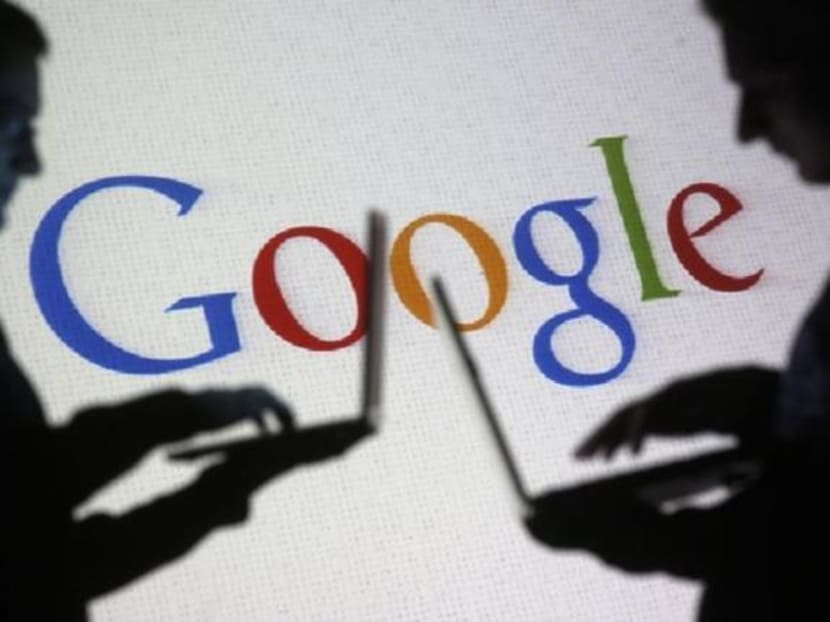Google facing antitrust showdown in Europe: Reports
SAN FRANCISCO — European regulators are poised to file a complaint alleging Google has been abusing its dominance in Internet search to thwart competition and innovation, according to a memo that the company sent to its employees yesterday (April 14).

People are silhouetted as they pose with laptops in front of a screen projected with a Google logo, in this picture illustration taken in Zenica October 29, 2014. Photo: Reuters
SAN FRANCISCO — European regulators are poised to file a complaint alleging Google has been abusing its dominance in Internet search to thwart competition and innovation, according to a memo that the company sent to its employees yesterday (April 14).
Mr Kent Walker, Google’s general counsel, wrote that a “statement of objections” to Google’s business practices will be released today by Europe’s top antitrust regulator, Margrethe Vestager.
Besides outlining their belief that Google has been illegally rigging its search results to favour its own services, European regulators also may announce they are opening an inquiry into whether Google is also using its popular Android software for mobile devices to gain an unfair advantage over other digital services, Mr Walker said.
A copy of the memo was posted online by the technology websites Re/Code and TechCrunch after The Financial Times, The Wall Street Journal and The New York Times reported Ms Vestager’s plans to take action against Google, the Internet’s most powerful company. Google confirmed Mr Walker wrote the memo late yesterday, but the company declined further comment.
The case sets up a legal battle that could culminate in Google being fined about US$6 billion (S$8.2 billion), or 10 per cent of its annual revenue, and force the Mountain View, California, company to overhaul its system for recommending websites in Europe. But the process could take several more years to resolve, especially if Google appeals any adverse decision issued by European regulators.
In the meantime, the allegations are likely to paint an unflattering picture of Google, which embraced “don’t be evil” as its creed a few years after CEO Larry Page and his Stanford University classmate Sergey Brin founded the company in a rented Silicon Valley garage in 1998.
“Expect some of the criticism to be tough,” Mr Walker wrote yesterday.
A complaint challenging Google’s conduct “would represent a significant step towards ending Google’s anti-competitive practises, which have harmed innovation and consumer choice”, said Mr Thomas Vinje, legal counsel for FairSearch Europe, a group that has been urging regulators to rein in Google.
Europe’s looming showdown with Google also could intensify scrutiny of a similar US antitrust investigation that the Federal Trade Commission settled in 2013 without finding any significant misbehaviour. A confidential report mistakenly released to The Wall Street Journal last month revealed the FTC’s legal staff had recommended suing Google for breaking antitrust laws only to be overruled by the agency’s governing commissioners.
Google has offered to make concessions on three previous occasions in an attempt to settle Europe’s nearly 5-year-old antitrust probe, only to have the negotiations unravel. The efforts to forge a truce occurred under Ms Vestager’s predecessor, Mr Joaquin Almunia, who stepped down late last year.
European regulators, like their US peers, have been looking into complaints that Google improperly highlights its own services in its search results at the expense of its rivals. The alleged favouritism corrals Google’s services, a strategy that Google’s critics contend enables the Internet’s most powerful company to sell more of the ads that generate most of its revenue, while diverting traffic from other websites trying to compete with their own products.
Much of the complaint may focus on how Google displays its results in response to requests made by people who appear to be shopping online, Mr Walker wrote.
Google repeatedly has denied any wrongdoing, arguing there is nothing preventing people from using other search engines to find information, entertainment and shopping recommendations. Critics, though, deride Google as a ruthless monopoly that wields its dominant position to stymie its rivals. By some estimates, Google processes about nine out of 10 search requests in parts of Europe - even more than in the US, where it commands about two-thirds of the market.
The push to crack down on Google is being led by a group of publishers and technology companies that includes Microsoft, which once tangled with Europe’s antitrust regulators over the way it bundled products with its Windows operating system.
An antitrust case against Google would be Europe’s biggest since regulators wrangled with Microsoft. AP





